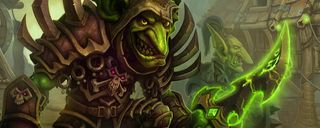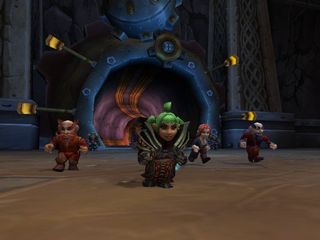Designing World of Warcraft: Tom Chilton interview

The Cataclysm is coming and PC Gamer will be there to watch the fireworks. We recently visited the Blizzard campus in Orange County to discover what secrets the next World of Warcraft expansion pack will deliver. There, we met Tom Chilton, the game's lead designer, and talked over the challenges and headaches that come from revitalising a game that has such passionate and devoted fans. Here is our conversation in full.

PCG: What lessons have you taken away from raiding in Wrath of the Lich King?
Tom Chilton: I would start with that we have to be very careful of letting people do both 10 and 25 man content. It started off without being a significant problem in Trial of the Crusader, because it was such a short instance that when people were doing 25 and 10 it was like: that's fine, it's still pretty lightweight in terms of time investment. But it became pretty brutal with Icecrown. We know we have to be pretty careful of that. We've learned a lot about our emblem system. We've learned that, at any given time, we want to have two tiers of currency. We want to have the top tier and the second tier, and not have it drag on and on. We've learned about making our raid locks a little bit more forgiving, because pick up group raids have become more popular than ever with Lich King, whereas that was really totally irrelevant in Burning Crusade and before that. The idea of being locked to a particular raid was totally palatable because, sure, how else are you possibly going to get a raid anyway?
PCG: When Lich King was in development I remember you saying “raids are awesome but not enough people are seeing them”. With Cataclysm is there a specific thing where you're thinking “this isn't living up to expectations, so we're putting our effort into that?”
Tom Chilton: I would say it's more incremental evolution of our philosophies and no radical departures. I think that we can continue to broaden the audience for raiding, and the things that we're doing are reasonable quality of life improvements. We don't have any thing as dramatic yet as a raid finder, like we introduced the dungeon finder. That's the next thing that, if we were able to make that work, that would significantly introduce a whole bunch of new people to raiding. We're just not at the point yet where we can make that work reliably.
PCG: You still need mods to raid. When your philosophy is making a lot of people join in, that still seems like a barrier to entry.
PC Gamer Newsletter
Sign up to get the best content of the week, and great gaming deals, as picked by the editors.
Tom Chilton: For sure. For sure. I think that the number of mods that you need to raid has gone down over time. I felt a lot more reliant on mods back before Burning Crusade than I do now. I think people are down to just using Deadly Boss Mods and even then it's interesting how the mods have evolved to broadcast important information to people who don't have the mods.
There are several cases where I've raided over the last six months or so when I didn't even have a mod installed, and I felt that I was able to do fine. Granted, that becomes less true as you're taking on more hardcore content, or, depending on role. I was playing a DPS role. If you're playing healer I think it's a different story.
With Cataclysm we definitely have a goal in mind of improving the healing experience and changing the gameplay enough to where you're paying more attention to the field and less attention to the mods, to where we can hopefully help that. I kinda doubt that we're going to completely solve it, at least with the launch of Cataclysm. Hopefully, with each patch we'll see continued improvement.
PCG: You're talking about continued improvement to the interface?
Tom Chilton: Right. Both continued improvement to our own interface, and improvement in terms of game mechanics to alleviate the need for the interface altogether.
PCG: I think one of the key lessons of World of Warcraft's success is that you always go for the big epic idea, but when that doesn't work you reduce it down that what is the most fun. So you went from 40 man raids to 10 man raids. Are there any more simplification... well, simplification's a really difficult word because people think it means dumbing down... Is there any more work you're doing to ease the burden?
Tom Chilton: A lot of the simplifications that we're doing are to do with our stats systems. We're trying to find stats that really aren't giving us a whole lot of bang for our buck, and simplifying those. We have a core philosophy that anything you add to the game, anything you add to the game at all - it doesn't really matter what it is, increases the complexity of the game.
What we're trying to evaluate in a lot of cases is whether you're getting a justifiable amount of depth out of that increase in complexity. An example would be: if we add a spell to the game, imagine we add a spell like dampen magic to the game, right? Then I think you can look at a spell like that and say it increased the complexity... people are putting it on their action bars, they're having to train it at some level, there might be a talent associated with it somewhere... if that spell doesn't have a clear role then it's increasing the complexity of the game but it's not increasing the depth. Spells without a clear function just adding complexity. We try to identify those things in any kind of expansion and as many as we can, as often as we can, we either try to eliminate it or find a way that it actually adds a justifiable amount of depth.
Most Popular





